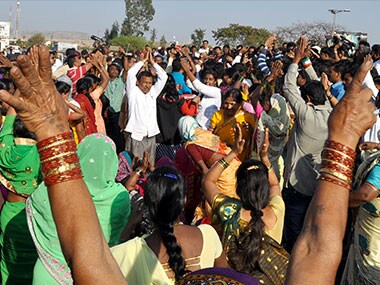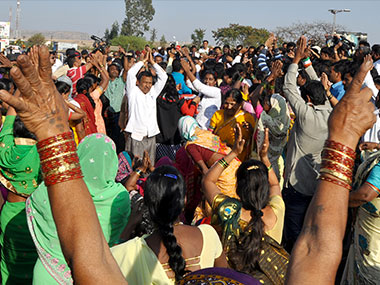In the context of an atmosphere of intolerance in India, the Bombay High Court has refused to be tolerant of an archaic, absurd and arbitrary practice where women are not allowed to enter temples and observe religious traditions and rituals within the premises of religious buildings. The court, in response to a Public Interest Litigation (PIL) filed by Vidya Bal and Nilima Varta, two activists from Pune, declared that no law prevents women from entering places of worship. The PIL challenges the archaic tradition that disbars the entry of women inside the sanctum sanctorum of the Shani Shingnapur temple in the Ahmednagar district of Maharashtra and claims that the prohibition is arbitrary, illegal and violative of the fundamental rights of a citizen, that the Constitution enshrines. A division bench of Chief Justice DH Waghela and Justice MS Sonak invoked the Maharashtra Hindu Place of Worship (Entry Authorisation) Act, 1956 and said that under this act, if a temple or person prohibits any person from entering a temple, then he or she will be subjected to six-month imprisonment as punishment. The discriminatory practice is also violative of Article 14 (equality before law), 25 and 26 (freedom of religion) of the Constitution. The two judges remarked - “There is no law that prevents entry of women in any place. If you allow men, then you should allow women also. If a male can go and pray before the deity, why not women? It is the State government’s duty to protect the rights of women.” [caption id=“attachment_2707474” align=“alignleft” width=“380”]  The Shani temple in Ahmednagar, Maharashtra. Solaris images[/caption] The paradigm of women’s human rights has been trapped between the age-old universalist and cultural relativist dichotomy for a long time. While addressing various reservations that don’t allow women to exercise their human rights, it has been seen that cultural practices are identified as primary sites of struggle. Women’s human rights have remained contested terrains in the protracted polarities of tradition and modernity. In India where the woman form is worshipped as a pantheon of goddesses, most women between the ages of ten to fifty are not allowed to enter religious buildings. Many religious customs portray women in this age-group to be impure and unworthy for praying and observing rituals because of their menstrual cycles. The Bombay High Court has taken this custom and turned it around on its head, stating that women should have “equal access to places of worship” and that “women can go where men can”. This progressive observation stretches like a bridge to form a nexus between constitutional freedoms and the religious customs, and in many ways, sets the stage for other ongoing conflicts between religious authorities and the law. On 5 April, 1991, a division bench of the Kerala High Court had upheld the prohibition of women offering worship at the Sabarimala shrine. The restriction was enforced under Rule 3 (b) of the Kerala Hindu Places of Public Worship (Authorisation of Entry) Rules, 1965 (women at such time during which they are not by custom and usage allowed to enter a place of public worship). The Kerala High Court had upheld the ban in 1991 and directed the Travancore Devaswom Board to implement it. Twenty-five years later, in January 2016, the Supreme Court has challenged the constitutional logic behind this 1500-year-old tradition, and asked for proof that would indicate that women did not enter the sanctum sanctorum 1500 years ago. The temple representatives have cited three arguments in favour of the restriction: the Constitution mandates that the belief of citizens must be protected; secondly, they speak of the notional ‘impurity’ of the menstruating women and thirdly, that it is not safe for women to take the strenuous pilgrimage to the shrine. These arguments are indicative of a patriarchal worldview where women are socially subordinate to men, and that religion and spirituality must be safeguarded from the polluting bodies of women. The Bombay HC’s observations may only be an obiter dicta to the Supreme Court but its implications are vast. It is a breath of fresh air as it does not merely challenge the constitutionality of a law, but goes beyond its reach and endeavours to uproot a socio-religious custom that breeds gender inequality. The observations will also have an impact on the PIL by Bharatiya Muslim Mahila Andolan on the entry of women into the Haji Ali Dargah in Bombay, as it will be absurd to have two separate stance on temples and dargahs. Unlike the American Constitution that explicitly vouches for the separation of the church from the state, the Indian Constitution combines freedom of religion clauses with a mandate that the state to intervene in religious affairs - Article 25 allows the state to restrict or regulate religious practices, thus, allowing for judicial responses to review customs or personal laws by the legislature. Our courts have a greater responsibility to apply rigorous standards of judicial scrutiny for removal of injustice against the women.
In response to a PIL on the Shani Shinganapur temple, the Bombay HC has refused to be tolerant of an archaic, absurd and arbitrary practice where women are not allowed to enter temples
Advertisement
End of Article


)

)
)
)
)
)
)
)
)



